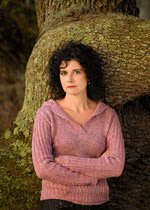I had just barely missed January's sales goal, to earn enough royalties on my self-published e-books to pay my cable internet bill. It is possible that I'd have made this goal if I hadn't experimented with dropping the price to $0.99 for part of the month on Wounded Earth.
Maybe I'd have sold fewer books if I'd kept the price at $2.99, but you know...$2.99 doesn't sound all that exorbitant for a full-length novel. And I couldn't tell that the lower price helped that much. So who knows? All I know is that I came darn close to meeting my goal, but I missed it. Still, it was my best month ever, so I didn't shed any tears. I just set a new goal.
So did I set a conservative goal for February? Oh, heck no. I set a goal to more than double January's record sales, thus earning enough royalties to pay this month's bill for my fancy-shmancy smart phone and its associated not-cheap data plan, with some left over for...oh, I don't know...taking my daughter out for sushi.
So how did I do? Once again, I had a great month, the best ever. And once again, I snookered myself by setting an ambitious goal and by lowering my price on my most expensive book for part of the month. Also, the calendar snookered me. I forgot that February was a short month. If this weekend's sales trends had continued, the extra two or three days in a regular month would have made the difference. Urgh. Nevertheless, February's unit sales were better than January's by more than 50% and I made more money by about 30%. February's royalties may have been short of my goal, but they were sufficient to pay my cable internet bill with enough left over to take my daughter to McDonald's. I really like it when my writing pays my bills and funds luxuries. (If a trip to McDonald's qualifies as a luxury...)
So what's my goal for March? Should I swallow a dose of realism? Or should I take note of my ever-increasing sales and continue with the current strategy of letting my reach exceed my grasp, which does seem to be working?
I've decided to hang tight with March's goal. I aim to pay this month's cell phone bill with my royalties. If I overshoot those sales, I'm sure I can find a way to spend that money. Here's my rationale for not ramping up the goal. My biggest sales in January and Febrary came on days when I placed ads in places where people read e-books, and I don't have any of those scheduled for March yet. (This could change, if I identify a desirable place to advertise.) I do, however, have a couple of important ads scheduled for April.
Thus, it makes sense to me to use March to build. I'll submit the book to carefully selected reviewers, and perhaps reviewers to whom I've already submitted will post those reviews. I'll continue building a web presence here and as a guest blogger and as a commenter on various sites, and I'll hope that these activities will keep sales growing steadily through March, resulting in royalties that will pay my cell phone bill. Since I don't like being less than bold, I'll go ahead and set my goal for April, which will be to sell enough books to pay my cable internet bill and my cell phone bill.
I sure hope I make that April goal, because once I hit that level, the obvious next goal is to pay my utility bill, and I'd far rather hit that level in May than in August. I live in Florida, for pete's sake. Do you know how much it costs to air condition this house? I've really got to build my sales up, if I hope to pay my utility bill in the summertime.
Amid all this gnashing of teeth over missing neatly quantifiable sales goals, I really need to tell you my unquantifiable good news. As you may or may not know, Amazon began giving authors access to some limited sales data a few weeks ago, which is coincidentally when I began this project to promote my self-published e-books. This information is tantalizingly qualitative, in that it only applies to sales in some venues and, at any one time, you can only get data on your three bestselling titles. I have eleven titles, so this isn't nearly enough information, but it's good enough to see trends.
I see unmistakable evidence that sales of all six of my traditionally published books, the Faye Longchamp mysteries, have gone up since I began promoting my self-pubbed stuff. Sales of the Kindle editions of those books have increased, which is perhaps unsurprising. The people to whom I'm promoting Wounded Earth
These trends can't be quantified, though I'll get some inkling of what's going on when my next royalty statement arrives from Poisoned Pen Press, but I'm not going to argue with improved sales. You know, I may actually have earned enough extra royalties on those books to have paid that cell phone bill, after all, but I'm not going to change my accounting method in mid-stream. I'll hang tough, and I won't give myself credit for making my goals unless I see hard, quantifiable numbers on the self-pubbed e-books.
Still, if those royalty checks from my print publisher are bigger because I've been promoting my e-books, I'm pretty sure I'll be able to think of a way to spend the money.
Mary Anna



















